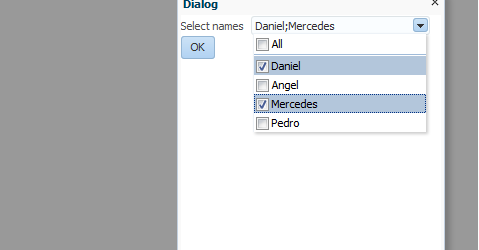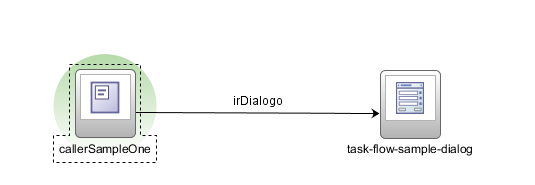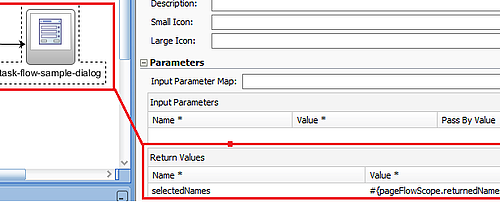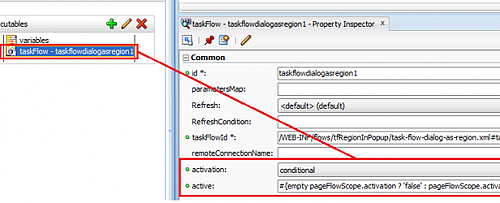Task Flows can be executed as Dialog as following:
- Being a Bounded Task Flow based on pages instead of fragments and used as Task Flow Call configured as inline-popup.
- Using a Bounded Task Flow inside of an af:popup
<af:panelgrouplayout id="pgl1" layout="vertical">
<af:panelheader id="ph1" text="Sample calling a Task Flow as dialog inside of an af:popup">
<af:panelgrouplayout id="pgl2" layout="vertical"> <af:commandbutton id="cb1" text="Call Task Flow in af:popup">
<af:showpopupbehavior popupid="p1" triggertype="action">
</af:showpopupbehavior></af:commandbutton>
<af:panelgrouplayout id="pgl3" layout="vertical" partialtriggers="cb1">
<!-- List returned by the Contextual Event thrown by the Region of the popup -->
<af:iterator id="i1" value="#{pageFlowScope.returnedNames}" var="name">
<af:outputtext id="ot1" value="#{name}">
</af:outputtext></af:iterator>
</af:panelgrouplayout>
</af:panelgrouplayout>
</af:panelheader>
<!-- Popups section -->
<af:popup contentdelivery="lazyUncached" id="p1" popupcanceledlistener="#{backingBeanScope.e_m_s_v_c_ct_callerTwoBean.cancelPopup}" popupfetchlistener="#{backingBeanScope.e_m_s_v_c_ct_callerTwoBean.fetchPopup}">
<!--The Region will be the responsible of closing the Dialog/Popup to send back the data -->
<af:dialog closeiconvisible="false" dialoglistener="#{backingBeanScope.e_m_s_v_c_ct_callerTwoBean.dialogListener}" id="d1" title="Region in Popup" type="none">
<af:region id="r1" value="#{bindings.taskflowdialogasregion1.regionModel}">
</af:region></af:dialog>
</af:popup>
</af:panelgrouplayout>
Pros and Cons
Solution One: TF-Call as inline-popup (based on Pages JSPX)
Pros:
- Task Flow can return values in the Return Value parameters.
Cons:
- It difficults to add custom styling (styleClass to af:popup or af:dialog).
- The Task Flow can not be used as Region.
Solution Two: Using Region inside of an af:popup
Pros:
- It can be reused as Region.
- It is easier to apply styleClass to components like af:popup / af:dialog
Cons:
- It can not return values using the parameters configured in Return Values. In case of returning values then an strategy of Contextual Events, Sharing a Bean or a regionNavigationListener should be used instead.
- Refresh Task Flow will require activation
The sample
Link to the GitHub Repository containing the sample
This sample requires some ADF 11gR1 knowledge to be understood.
Each solution can be shown by the following test pages:
- testPopupInTFCall.jspx: Executes the Solution One based on a TF-Call. Important things that have to be considered:
- The button uses the property useWindow="true" to execute in dialog mode.
<af:commandbutton action="irDialogo" id="cb1" text="Call Task Flow" usewindow="true">
</af:commandbutton>
- It returns the values configured in the Return Value parameters.
- The button uses the property useWindow="true" to execute in dialog mode.
- testPopupInRegion.jspx: Demostrates the Solution Two based on a Region inside of an af:popup. Things that have to be considered:
- Activation policy that will control the activation/deactivation of the Task Flow when opening / cancelling the popup.
- Uses Contextual Events to return values to the caller (The invoked Task Flow fires a Contextual Event programmatically before dimissing).
<pagedefinition id="callerSampleTwoPageDef" package="fragments.flows.tfRegionInPopup" version="11.1.1.64.93" xmlns="http://xmlns.oracle.com/adfm/uimodel">
<parameters>
<executables>
<variableiterator id="variables">
<taskflow activation="conditional" active="#{empty pageFlowScope.activation ? 'false' : pageFlowScope.activation}" id="taskflowdialogasregion1" taskflowid="/WEB-INF/flows/tfRegionInPopup/task-flow-dialog-as-region.xml#task-flow-dialog-as-region" xmlns="http://xmlns.oracle.com/adf/controller/binding">
<parameters>
<parameter id="isPopup" value="#{true}">
</parameter></parameters>
</taskflow>
</variableiterator></executables>
<bindings>
<methodaction action="invokeMethod" datacontrol="ContextualEventHandlerDC" id="handleReturnEvent" instancename="ContextualEventHandlerDC.dataProvider" isviewobjectmethod="false" methodname="handleReturnEvent" requiresupdatemodel="true">
<nameddata ndname="names" ndtype="java.util.List">
</nameddata></methodaction>
</bindings>
<eventmap xmlns="http://xmlns.oracle.com/adfm/contextualEvent">
<event name="returnDialogEvent">
<producer region=" taskflowdialogasregion1.dialogRegionViewPageDef.returnDialogEventBinding">
<consumer handlecondition="" handler="handleReturnEvent" region="">
<parameters>
<parameter name="names" value="#{payLoad}">
</parameter></parameters>
</consumer>
</producer>
</event>
</eventmap>
</parameters>
</pagedefinition>
public void performClose(ActionEvent ae) { // Execute the Contextual Event programmatically before of unloading the popup BindingContainer bindingContainer = BindingContext.getCurrent().getCurrentBindingsEntry(); JUEventBinding eventBinding = (JUEventBinding)bindingContainer.get("returnDialogEventBinding"); ActionListener actionListener = (ActionListener)eventBinding.getListener(); actionListener.processAction(ae); // Check the Input Parameter if the TF has to be considered as executed in popup AdfFacesContext adfFacesContext = AdfFacesContext.getCurrentInstance(); Map<string object=""> flowScope = adfFacesContext.getPageFlowScope(); Boolean isPopup = (Boolean)flowScope.get("isPopup"); if (isPopup != null && isPopup) { this.closePopup(ae); } }
public final class ContextualEventHandlerDC { /** * Default Constructor */ public ContextualEventHandlerDC() { super(); } /** * Get the list of names returned by the Contextual Event * @param names */ public void handleReturnEvent(List<string> names) { for (String s: names) { System.out.println(s); } AdfFacesContext.getCurrentInstance().getPageFlowScope().put("returnedNames", names); } }
- Activation policy that will control the activation/deactivation of the Task Flow when opening / cancelling the popup.
Sample built using JDeveloper 11.1.1.7





